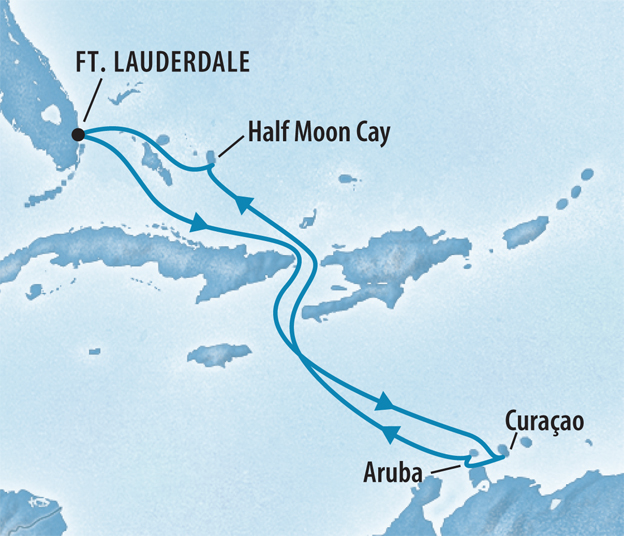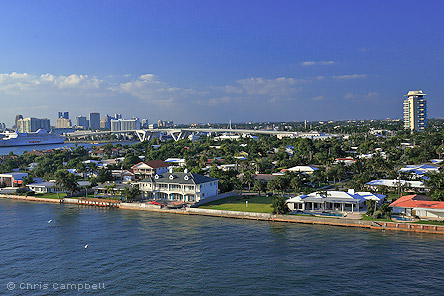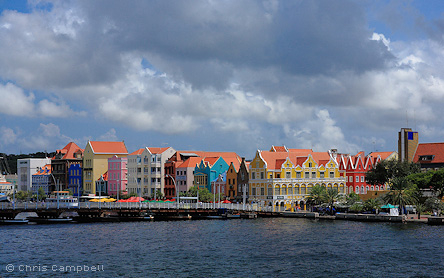

| DAY | PORT | ARRIVE | DEPART | PROJECTS/LECTURES | |
| FRIDAY, DEC. 3 | FT. LAUDERDALE | — | 5pm | 6:30pm, Bon Voyage COCKTAIL PARTY* | |
| SATURDAY, DEC. 4 | AT SEA | — | — | 10am – NOON & 1:30pm – 4:30pm; 5pm – 6:30pm | |
| SUNDAY, DEC. 5 | AT SEA | — | — | 10am – NOON & 1:30pm – 4:30pm; 5pm – 6:30pm | |
| MONDAY, DEC. 6 | ORANJESTAD, ARUBA | 8am | Midnight | — | |
| TUESDAY, DEC. 7 | WILLEMSTAD, CURAÇAO | 7am | 1pm | 1:30pm – 5pm; & 6:30pm, COCKTAIL PARTY* | |
| WEDNESDAY, DEC. 8 | AT SEA | — | — | 10am – NOON & 1:30pm – 4:30pm; 5pm – 6:30pm | |
| THURSDAY, DEC. 9 | HALF MOON CAY, BAHAMAS | 8am | 4pm | 5pm – 6pm; 6:30pm, COCKTAIL PARTY* | |
| FRIDAY, DEC. 10 | FT. LAUDERDALE, FLORIDA | 7am | — | Do not fly out prior to 11:30am | |
| *Open bar plus hot & cold hors d'oeuvres served. All guests invited. | |||||

»» Ft. Lauderdale restaurants »»
»» Greater Ft. Lauderdale Convention and Visitors Bureau »»
»» Tri-Rail / Regional Rail »»

»» Interactive map (4mb PDF file) »»
»» Getting to Arikok National Park »»
»» Creole Language Map of the Caribbean »»
»» Island of Curaçao (3mb PDF file) »»
»» Downtown Willemstad (2mb PDF file) »»
»» Willemstad historic website »»
»» New York Times Travel on Curaçao »»
»» Curaçao and the slave trade »»
»» Languages of Curaçao/Netherlands Antilles »»
»» Creole Language Map of the Caribbean »»

»» New York Times Curacao restaurant suggestions »»
»» Curacao.com restaurant guide »»
»» The Bahamas National Trust »»
FIND BOOKS (on right)
ABOUT OUR PORTS OF CALL:
Ft. Lauderdale
The Bahamas
The Caribbean
Aruba
Curaçao
HERE WAS THE WEATHER FOR THE 10 DAYS OF OUR CRUISE, DURING THE YEAR INDICATED. HISTORICAL AVERAGES (from Dec. 3–10) ARE FROM THE MID ’90s TO CURRENT DAY.
Ft. Lauderdale 2007 2008
Historical Averages
The Bahamas 2007 2008
Historical Averages
The Caribbean 2007 2008
Historical Averages
Aruba 2007 2008
Historical Averages
Curaçao 2007 2008
Historical Averages
The Rough Guide to Miami & South Florida is the definitive guide to the ever-emerging city of Miami and the hot and happening Southern Florida. The only guide to this region which has a dedicated full-length chapter on Fort Lauderdale, The Rough Guide to Miami & South Florida is fully updated, with expanded listings of restaurants, accommodation, and nightlife for all budgets, and everything from art museums to sun drenched beaches.
The Swamp: The Everglades, Florida, and the Politics of Paradise: Washington Post reporter Grunwald brings the zeal of his profession—and the skill that won him a Society of Environmental Journalists Award in 2003—to this enthralling story of “the river of grass” that starry-eyed social engineers and greedy developers have diverted, drained and exploited for more than a century. In 1838, fewer than 50 white people lived in south Florida, and the Everglades was seen as a vast and useless bog. By the turn of this century, more than seven million people lived there (and 40 million tourists visited annually). Escalating demands of new residents after WWII were sapping the Everglades of its water and decimating the shrinking swamp’s wildlife. But in a remarkable political and environmental turnaround, chronicled here with a Washington insider’s savvy, Republicans and Democrats came together in 2000 to launch the largest ecosystem restoration project in America’s history. This detailed account doesn't shortchange the environmental story — including an account of the senseless fowl hunts that provoked abolitionist Harriet Beecher Stowe’s 1877 broadside “Protect the Birds.” But Grunwald’s emphasis on the role politics played in first despoiling and now reclaiming the Everglades gives this important book remarkable heft.
The New History of Florida: Written to observe the sesquicentennial of statehood, this is a comprehensive history of the state of Florida. The book contains 22 chapters, in which the authors present political, economic, military and religious information, as well as social history and personal experiences.
Florida Indians and the Invasion from Europe: When the conquistadors arrived in Florida as many as 350,000 native Americans lived there. Two and a half centuries later, Florida’s Indians were gone. This text focuses on these native peoples and their lives, and attempts to explain what happened to them.
A–Z of Bahamas Heritage: Designed as a lively encyclopedia, this includes all the elements that constitute the heritage of modern Bahamians: historical, geographical, economic, political, social and cultural. Key events, institutions, customs and personalities are not just described but evaluated. Compiled by the premier historian of The Bahamas and four years in the making, this sparkling reference book is the distillation of research and analysis spread over half a century.
A Brief History of the Caribbean: From the Arawak and Carib to the Present: Offered as a brief history of a diverse and intriguing region, this work is a veritable sourcebook of information about the Caribbean, ranging from the climate to vegetation to colonial history to politics. The book, in five parts, covers Spanish rule, the northern European influence, the sugar empire, independence, and post-World War I development.
A Continent of Islands: Searching For the Caribbean Destiny: A penetrating analysis of the social, political, sexual, and cultural worlds that exist behind the four-color Caribbean travel posters. Kurlansky, who reports on the Caribbean for The Chicago Tribune, The New York Times, etc., has wide-ranging interests. Here, he discusses such diverse (and unexpected) aspects of his subject as the politics of hurricanes — how island leaders and their rivals take advantage of natural disasters to further their aims; the effects of AIDS on sexual practices throughout the region — the sections on Castro’s handling of the AIDS emergency are particularly engrossing; and the impact of American Fundamentalist proselytizing on traditional West Indian religious groups. One of Kurlansky’s major themes is the danger inherent in a tourism-based island economy.
Frommer’s Portable Aruba, Bonaire, and Curaçao
Hunter Travel Guide Aruba, Bonaire and Curaçao Alive: A thorough revision — now with color maps and photos throughout — of this comprehensive guide to the popular ABC islands, located just off the Venezuelan coast. Discover the quiet life of Bonaire, gamble away at Aruba’s casino, hit the high-style designer clothing stores in Curaçao, and relax on the glorious white beaches of all three! Here is the ultimate guide to discovering the high life and cool spots of the ABCs, written by authors who have sacrificed their vacations to research this book (poor things!). This Alive Guide focuses on shopping (snatch up some duty-free bargains), hotels and restaurants (colorful local cuisine and fine dining alike), with special attention paid to the cream of the crop. Sightseeing, historical walking tours, wildlife discovery, and watersports are also covered. The activity-oriented Sunup to Sundown sections will fill your day with beaches, deep-sea fishing charters, diving excursions, moped rides and more, while After Dark tells you of the best happy hours, the liveliest clubs and the bars where things really hop! Handy A–Z sections for each island provide all the practical details — airline offices, banking hours and locations, emergency telephone numbers, shopping hours, tourist information booths. Easy-to-read maps and a detailed index complete the picture.
Paradise Overseas: The Dutch Caribbean — Colonialism and its Transatlantic Legacies: Paradise Overseas presents a tour around the main themes of Dutch Caribbean history and its contemporary legacies. Drawing on wide expertise in Caribbean and Latin American studies, Gert Oostindie strongly posits a refreshing analysis of the Dutch Caribbean in a comparative framework which will be of interest to historians, anthropologists and political scientists alike. Rather than aiming at a comprehensive narrative, he offers a thematic discussion of topics such as the contrasts between Dutch colonization in the Americas and Asia; African slavery, Asian indentured labour and the shaping of plural societies in the Dutch Caribbean; the major contrasts between and within the six Antillean islands and Suriname; the different trajectories of decolonisation and their subsequent costs and benefits; and the changing significance of ethnicity and national identity both in the Dutch Caribbean and its diaspora.
Frommer’s Portable Aruba, Bonaire, and Curaçao
Hunter Travel Guide Aruba, Bonaire and Curaçao Alive: A thorough revision — now with color maps and photos throughout — of this comprehensive guide to the popular ABC islands, located just off the Venezuelan coast. Discover the quiet life of Bonaire, gamble away at Aruba’s casino, hit the high-style designer clothing stores in Curaçao, and relax on the glorious white beaches of all three! Here is the ultimate guide to discovering the high life and cool spots of the ABCs, written by authors who have sacrificed their vacations to research this book (poor things!). This Alive Guide focuses on shopping (snatch up some duty-free bargains), hotels and restaurants (colorful local cuisine and fine dining alike), with special attention paid to the cream of the crop. Sightseeing, historical walking tours, wildlife discovery, and watersports are also covered. The activity-oriented Sunup to Sundown sections will fill your day with beaches, deep-sea fishing charters, diving excursions, moped rides and more, while After Dark tells you of the best happy hours, the liveliest clubs and the bars where things really hop! Handy A–Z sections for each island provide all the practical details — airline offices, banking hours and locations, emergency telephone numbers, shopping hours, tourist information booths. Easy-to-read maps and a detailed index complete the picture.
Paradise Overseas: The Dutch Caribbean — Colonialism and its Transatlantic Legacies: Paradise Overseas presents a tour around the main themes of Dutch Caribbean history and its contemporary legacies. Drawing on wide expertise in Caribbean and Latin American studies, Gert Oostindie strongly posits a refreshing analysis of the Dutch Caribbean in a comparative framework which will be of interest to historians, anthropologists and political scientists alike. Rather than aiming at a comprehensive narrative, he offers a thematic discussion of topics such as the contrasts between Dutch colonization in the Americas and Asia; African slavery, Asian indentured labour and the shaping of plural societies in the Dutch Caribbean; the major contrasts between and within the six Antillean islands and Suriname; the different trajectories of decolonisation and their subsequent costs and benefits; and the changing significance of ethnicity and national identity both in the Dutch Caribbean and its diaspora.
GENERAL INFORMATION AND DOCUMENT REQUIREMENTS
A Passport (valid through March 10, 2011 or 90 days after your return from this
trip) is required. Non-U.S. citizens residing in the United States will need
valid Alien Registration (green) cards as well. All others must have valid passports
and any required visas when boarding the vessel. All travel documents such as
passports, visas, proof of citizenship, etc., that are required for embarkation,
disembarkation at the ports of call, and re-entry into the United States are
the responsibility of the passenger. American citizens should visit the U.S.
Department of State for information on entry requirements for a specific country.
Please go to the Entry/Exit
Requirements section in the Country Specific Information for the country
you are interested in. You may also contact the U.S. embassy or consulate of
that country for further information.
Non-U.S. citizens are asked to check with their government agencies, embassies or consulates to determine documentary requirements. You may be denied boarding without proper proof of citizenship. All travel documents such as passports, visas, proof of citizenship, etc., that are required for embarkation, disembarkation at the ports of call, and re-entry into one’s country of residence are the responsibility of the passenger.
The National Passport Information Center (NPIC) is the U.S. Department of State’s single, centralized public contact center for U.S. passport information. Telephone: 1-877-4-USA-PPT (1-877-487-2778); TDD/TTY: 1-888-874-7793. Passport information is available 24 hours, 7 days a week. You may speak with a representative Monday–Friday, 8am–10pm, Eastern Time, excluding federal holidays.
U.S. EMBASSIES & CONSULATES ALONG OUR ITINERARY
There is no U.S. Embassy or Consulate in Aruba. Issues relating to U.S. citizens in Aruba are handled by the U.S. Consulate General in Curacao, which is located at J.B. Gorsiraweg #1, Willemstad, Curaçao. The Consulate’s telephone is (599-9) 461-3066; fax (599-9) 461-6489; email: info@amcongencuracao.an. The Consular section walk-in hours, in Willemstad, are Monday, Wednesday, and Friday from 9am–11am
The U.S. Embassy is located next to McDonald’s restaurant on Queen Street in downtown Nassau. The Embassy’s phone number is (242) 322-1181 during business hours; after hours call (242) 328-2206. The Consular Section’s American Citizen Services hours are 9am–11am and 1pm–3pm Monday–Thursday, and 9am–11am on Fridays. The Embassy is closed on local and U.S. holidays.
The United States Consulate General in Curaçao is located at J.B. Gorsiraweg 1, Willemstad. The Consulate’s phone number is 599-9-461-3066 and its fax is 599-9-461-6489; its email is infocuracao@state.gov. The Consulate is open Monday–Friday 8am–5pm, with walk-in hours Monday, Wednesday, and Friday 9am–11am ONLY. All Consular offices are CLOSED on Saturday, Sunday, and all U.S. and Curaçao holidays. The email for American citizen services is ACSCuracao@state.gov.
CDC TRAVELERS’ HEALTH
WEBSITE
Travelers can check the latest health information with the U.S. Centers for Disease
Control and Prevention in Atlanta, Georgia. A hotline at 800-CDC-INFO (800-232-4636)
and a website give
the most recent health advisories, immunization recommendations or requirements,
and advice on food and drinking water safety for regions and countries. The CDC
publication Health
Information for International Travel is worth looking over.
U.S.
CENTERS FOR DISEASE CONTROL AND PREVENTION (CDC)
Health information, with Recommendations or Requirements for Vaccine-Preventable
Diseases for travelers to Aruba, The Bahamas, and Curaçao, Netherland Antilles.
U.S.
CUSTOMS AND BORDER PROTECTION
For information on airport and port-related declaration of goods, immigration issues,
and more.
RELEVANT FOREIGN EMBASSIES
Aruba is a self-governing region of the Kingdom of the Netherlands. For further information concerning visas and entry requirements for Aruba, travelers should contact The Royal Netherlands Embassy at 4200 Linnean Avenue NW, Washington, District of Columbia, 20008, USA; by telephone at 1-202-244-5300; online; or at the nearest Netherlands Consulate in Boston, Chicago, Los Angeles, Miami, or New York.
For further information concerning visas and entry requirements for The Bahamas, travelers should contact the Embassy of The Commonwealth of the Bahamas at 2220 Massachusetts Avenue N.W, Washington, D.C. 20008, USA; by telephone at 1-202-319-2660; by email at bahemb@aol.com; or at the nearest Bahamian Consulate in New York (Bahamas House, 231 East 46th Street, NY, New York, 10017; telephone 1-212-421-6420; email consulate@bahamasny.com) or Miami (Ingraham Building Suite 818, 25 South East Second Avenue, Miami, Florida, 33131).
Curaçao is a self-governing region of the Kingdom of the Netherlands. For further information concerning visas and entry requirements for Curaçao, Netherlands Antilles, travelers should contact The Royal Netherlands Embassy at 4200 Linnean Avenue NW, Washington, District of Columbia, 20008, USA; by telephone at 1-202-244-5300; online; or at the nearest Netherlands Consulate in Boston, Chicago, Los Angeles, Miami, or New York.
U.S. STATE DEPARTMENT’S COUNTRY-SPECIFIC INFORMATION FOR U.S. CITIZENS
Important details on entry and exit requirements for U.S. citizens, information on safety and security, crime, MEDICAL FACILITIES AND HEALTH INFORMATION, and more are located here.
Important details on entry and exit requirements for U.S. citizens, information on safety and security, crime, MEDICAL FACILITIES AND HEALTH INFORMATION, and more are located here.
Important details on entry and exit requirements for U.S. citizens, information on safety and security, crime, MEDICAL FACILITIES AND HEALTH INFORMATION, and more are located here.
ELECTRICITY
The electric current used in Aruba is 100 Volts. Electricity in the Bahamas is normally 120 volts AC (60 cycles). Electricity in Curaçao is 110 – 130 volts (50 cycles) similar but not identical to the US standard.
CALLING INTERNATIONALLY
To call Aruba from the United States, dial the international prefix, 011; then Aruba’s country code, 297; and then dial the actual phone number. To make an international call from Aruba, you must dial 00, followed by the country code, the area code, and the telephone number. For example, to call InSight Cruises from Aruba, you would dial 00-1-650-787-5665.
To call The Bahamas from the United States, dial 1; then The Bahamas’s country code, 242, plus the seven-digit local number. To make an international call from The Bahamas, you dial 011, followed by the country code, the area code, and the telephone number. For example, to call InSight Cruises from The Bahamas, you would dial 1-650-787-5665.
To call Curaçao from the United States, dial the international prefix, 011; then Curaçao’s country code, 599; and then the eight-digit phone number. To make an international call from Curaçao, you must dial 00, followed by the country code, the area code, and the telephone number. For example, to call InSight Cruises from Curaçao, you would dial 00-1-650-787-5665.
U.S.
DEPARTMENT OF STATE EMERGENCY ASSISTANCE TO AMERICAN CITIZENS ABROAD
U.S. Department of State Emergency Assistance to American Citizens Abroad: American
Citizens Services and Crisis Management (ACS).
U.S. DEPARTMENT OF STATE BACKGROUNDER ON:
264 S. Meridith Ave., Pasadena, CA 91106 • 650-787-5665 • Copyright 2010 © InSight Cruises